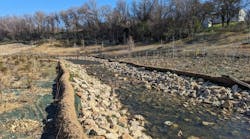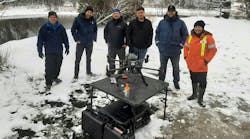Less than one in five water workers are women, according to a 2019 study from the World Bank’s Water Global Practice, and an earlier Brookings Institution study points to women accounting for less than 15% of the water workforce in the U.S. But for those select few organizations, who have married female leadership with key roles in community engagement, sustainability, economic development, diversity and inclusion, these leaders are removing barriers and evolving conversations around the importance of water as a significant resource to us all and the devastating impacts that will continue to occur if we are not working collectively to find solutions to these challenges.
Through continuous career evolutions over my over 13 years at Corvias, I have been afforded opportunities to support military families; to build sustainable solar solutions and transition into working with local urban communities in the municipal storm water industry driven by the Clean Water Act; and to partner with municipal governments to develop, implement and manage community-based partnerships, where we connect water quality improvements at scale with measured performance-based social impact beyond the traditional model of water capital programs and operations. Our community-based partnership model guarantees there is accountability for social and economic values with performance metrics incorporated into our programs inclusive of impactful connectivity and results. Driven from the understanding that water is an essential resource, the water industry needs greater integration with communities framed around a larger “so what” related to the work we do that closely impacts the communities in which we work.
In taking a step back, my previous infrastructure industry experience has been invaluable in my current work, however, it has been my personal interest in relating to “why” we build infrastructure and its importance to shaping a community’s health, prosperity and social justice in a context that isn’t riddled with the technical language of “what” is built. By its nature, the construction industry is deemed “non-traditional” for women by various studies. For instance, the National Association of Women in Construction stated that women account for just 1.5% of the entire U.S. workforce in the field.
It has been empowering for me to see women in roles as business owners, engineers, construction managers, watershed restoration managers, community engagement experts, economic development leads, environmental specialists, sustainability managers and beyond. Their drive and commitment in themselves, their work and their communities remind me that we too have important seats at the table. I also had the advantage of working and being connected with numerous women leading the charge, in both public and private sector agencies, who are making impacts locally, regionally and nationally. They are influencing and shaping the future of this industry. A few notable mentions include Dominique Lueckenhoff, SVP Corporate Affairs &Sustainability, Hugo Neu; Bre Plier, manager of Sustainability, Milwaukee Metropolitan Sewerage District; and Councilwoman Portia West, director of Streets & Public Improvements, city of Chester, Pennsylvania. I encourage you to search their names and make connections. Their interest, experience and investment in this work we do is bound to motivate you to color outside of the lines.
We will always work to challenge and support one another – leaving an impact on communities that require environmental intervention or assistance. We will continue to influence the water and storm water industry by making sure our voices are heard and are leading the conversation.






